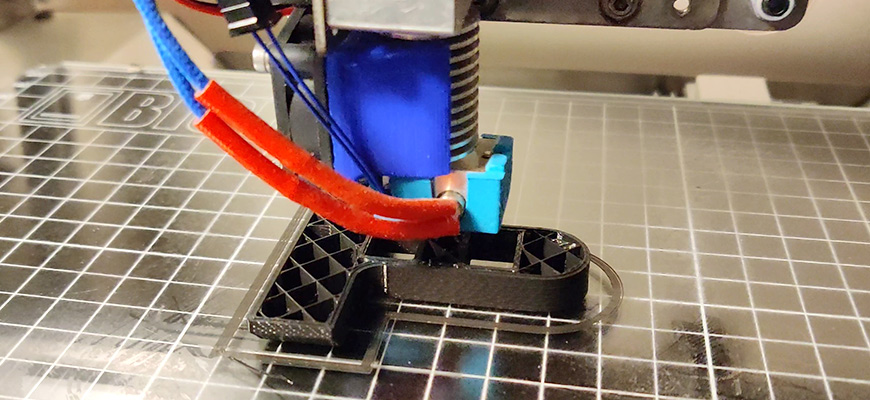
Prisma Health collaborates with UofSC on ventilator expansion device
Collaborative effort involving Prisma Health and UofSC develops ventilator expansion device for COVID-19 patients
Posted on: March 25, 2020; Updated on: March 25, 2020
By David Lee, leedh4@mailbox.sc.edu, 803-777-7548
Update April 20, 2020
Since the original publication of this article, Prisma Health has teamed with Ethicon Inc., part of the Johnson & Johnson Medical Devices Companies, to make and distribute the VESper™ Ventilator Expansion Splitter. Ethicon will manufacture and distribute the device at no cost to health care providers in the United States.
A collaborative effort involving Prisma Health and the University of South Carolina has resulted in emergency use authorization for a ventilator expansion device to support multiple patients during times of acute equipment shortages such as the current COVID-19 pandemic. The effort aims to save lives at a time when the nation may face a critical shortage of ventilators in the near future.
Prisma Health announced Wednesday that it has received the authorization from the U.S. Food and Drug Administration (FDA) for VESper™, a unique ventilator expansion device that allows a single ventilator to support up to four patients. Produced using 3D printing technology, the device is developed with material already in use for medical devices and produced at minimal cost.
Drawing on the strength of Prisma Health’s existing academic partnerships, specifications for the new device were sent to engineers at the University of South Carolina for 3D materials testing and printing of prototypes. The team began working to secure FDA approval, and collaborations with private sector businesses came together within a matter of days.
Prisma Health experts are working with national COVID-19 teams that have no more ventilator capacity and can initiate emergency use of the prototype. Prisma Health will be working closely with these teams during field testing to monitor clinical outcomes. Those field tests will determine whether the device performs as designed, per FDA guidelines.
Emergency use authorization can offer critical care patients access to a medical device
that has not gone through normal FDA approval; this is used when no comparable or
satisfactory alternative options are available.
Immediately, we realized we had an opportunity to impact patient outcomes all over the country, and potentially beyond the U.S.
Dr. Marjorie Jenkins, chief academic officer for Prisma Health
“When we see rapid increases in patients who require machine-assisted breathing, an
acute shortage of necessary equipment can happen overnight,” says Peter Tilkemeier,
chair of the Department of Medicine at Prisma Health–Upstate. “The VESper™ device
can be lifesaving when the number of critically ill patients requiring breathing support
is greater than the number of available ventilators. A number of U.S. hospitals are
likely to begin experiencing this with COVID-19.”
A Prisma Health Emergency Medicine physician realized the opportunity of using a single machine to breathe for multiple patients. Working collaboratively with her husband, a software engineer, and with a Prisma Health pulmonary critical care physician, this team began developing specifications for a “Y” splitter tubing that would meet international quality standards, be easily produced, allow for appropriate filtering of bacteria and viruses in the ventilator tubing, be strong and impact resistant, and would not impact the care of other patients connected to the same machine.
“Immediately, we realized we had an opportunity to impact patient outcomes all over the country, and potentially beyond the U.S.,” says Dr. Marjorie Jenkins, chief academic officer for Prisma Health in the Upstate market and dean of the University of South Carolina School of Medicine Greenville. “What we needed was a collaborative team to put the plan in motion and close the loop between design, production, FDA approval, and distribution to hospitals with critical need.”
Physicians used the simulation center at the School of Medicine Greenville to begin testing the VESper™ device with medical manikins, allowing for the simulation of multiple clinical scenarios. The device was able to deliver the appropriate breathing parameters without difficulty, creating an opportunity to pursue an application for emergency use authorization with the FDA in order to rapidly bring this lifesaving device directly into clinical use.
Team members from the UofSC College of Engineering and Computing have contributed in a variety of ways to help make the effort come together. Associate professors Tarek Shazly and Lang Yuan have provided consultation on biomechanics, biomaterial aspects and 3D printing materials and technologies. Research assistant professor Wout De Backer is assisting with manufacturing of plastic 3D-printed parts as well as evaluating other options for mass production.
Hospitals can begin to apply to receive the free source code and printing specifications for the device today by registering on Prisma Health’s website for use in printing the VESPer™ device. Prisma Health is collaborating with other major companies such as HP Inc. and its Digital Manufacturing Network to quickly scale 3D production of validated parts for distribution in areas of greatest need and areas with the potential to exceed their ventilator capacity in the near future, such as COVID-19 “hot spots” as designated by the Federal Emergency Management Agency. Currently, Prisma Health and South Carolina hospitals have enough ventilators available for patients.
“This is an exemplary demonstration of innovation and collaboration,” says Mark O’Halla, president and chief executive officer of Prisma Health. “I am so proud of the creativity and perseverance of our clinical team who came together to develop a lifesaving solution at a critical time for our country, our communities and our patients. New ideas and quick solutions will go a long way in helping us in our efforts to conquer the COVID-19 public health crisis.”